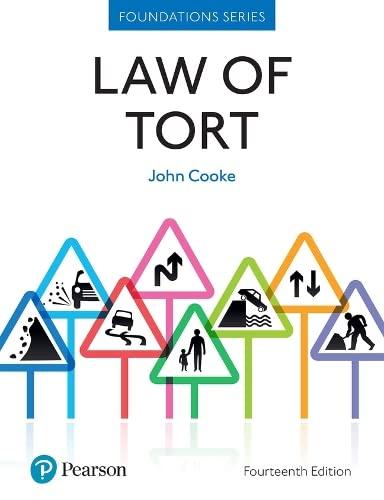Question
1.There is a () to the Full Faith Credit Doctrine which allows states to disregard the laws of another state. a)Public policy exception b)Subject matter
1.There is a () to the "Full Faith Credit Doctrine" which allows states to disregard the laws of another state.
a)Public policy exception
b)Subject matter jurisdiction problem
c)Venue Issue
d)Both A & C
2.The risky loss concept
a)Is found in the Uniform Commercial Code
b)Is dependent upon who owns the property
c)May consist of a "shipment" contract or a "destination" contract each with different rules
d)Both A & C
3.The process which judges apply the decisions and rules of prior cases over which they are currently presiding is called
a)Precedent
b)Status & process
c)Statutory decision making
d)Rule of the case
4.The warranty that comes with the sale of every good and requires that the goods be fit for the ordinary purpose for which they were intended is called
a)An implied warranty of habitability
b)Implied warranty of fitness for a particular purpose
c)An express warranty
d)An implied warranty of merchantability
1.If a husband owned real estate before he became married, Pennsylvania divorce law
a)Only looks at the increase in value of the property since the marriage up to the date of separation
b)Prohibits any distribution to the wife
c)Divides the property 50-50
d)None of the above
2.An offer for a unilateral contract
a)Once revoked is no longer valid
b)Is not a contract
c)Must be accepted by completion of an act
d)All of the above
3.There were 6 witnesses in a case. Five (5) witnesses testified on behalf of the defendant and 1 testified on behalf of the plaintiff. The plaintiff won a civil action against the defendant. Defendant appeals
a)Defendant will prevail because of the number of witnesses
b)Defendant can win if Judge did something wrong
c)Plaintiff will lose cause of the preponderance of evidence
d)Both A & C
4.A father leaped over the railing of his porch when he saw that his son was hit by a car in front of his house. The father was injured. The father sued the driver for his injuries.
a)He can't collect, it's a ridiculous lawsuit
b)He can collect under the doctrine of "danger invites rescue
c)He can collect under the "good Samaritan rule"
d)None of the above
Step by Step Solution
There are 3 Steps involved in it
Step: 1

Get Instant Access to Expert-Tailored Solutions
See step-by-step solutions with expert insights and AI powered tools for academic success
Step: 2

Step: 3

Ace Your Homework with AI
Get the answers you need in no time with our AI-driven, step-by-step assistance
Get Started


